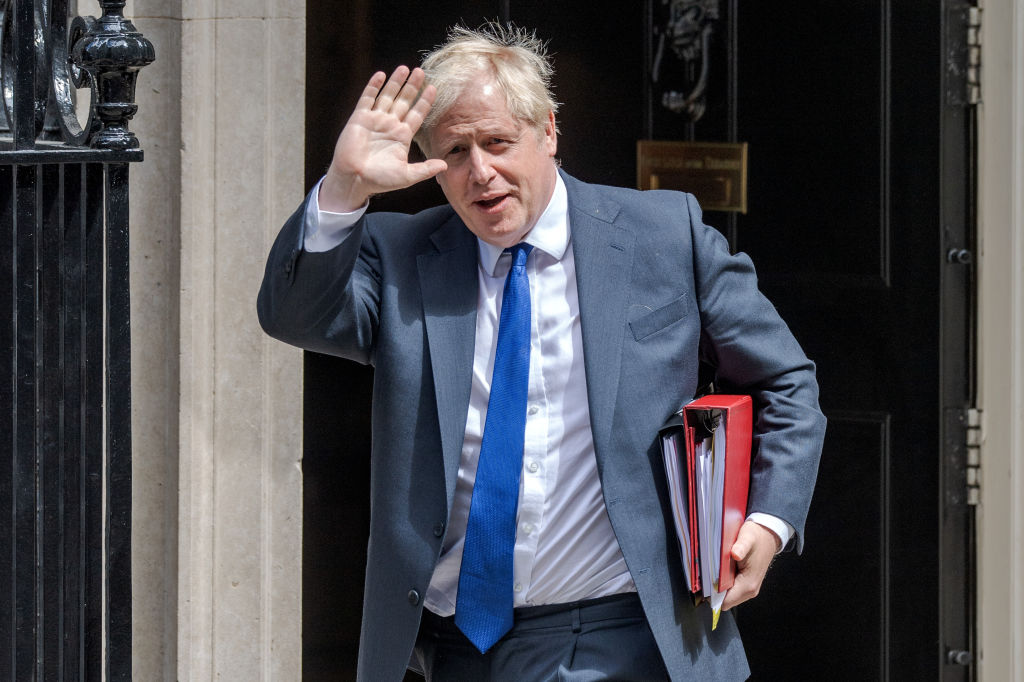
LONDON, UNITED KINGDOM – JULY 6: British Prime Minister Boris Johnson leaves Number Ten of Downing Street on Wednesday, July 6 2022. Prime Minister Johnson is expected to face opposition in the Houses of Commons on today’s weekly PMQs after he reshuffled his Cabinet the day before following a stark series of resignations by dozens of junior ministers as well as most senior ministers such as Chancellor Rishi Sunak and Health Secretary Sajid Javid who resigned on Tuesday. (Photo by Stuart Brock/Anadolu Agency via Getty Images)
In the wake of more than 50 high-level resignations from his government, British Prime Minister Boris Johnson has resigned from office just three years after winning an historic landslide victory. The PM said that he intends to remain in office until a new leader can be appointed by the Conservative Party. Whether he will be permitted to do so remains a significant question.
 Delivering his resignation, Johnson said:
Delivering his resignation, Johnson said:
“It is clearly now the will of the Parliamentary Conservative Party that there should be a new leader of that party and therefore a new Prime Minister. And I have agreed … that the process of choosing that new leader should begin now, and the timetable will be announced next week… I have today appointed a cabinet to serve as I will until a new leader is in place.
“I want to say to the million of people who voted for us in 2019 – many of them voting Conservative for the first time: Thank you for that incredible mandate, the biggest Conservative majority since 1987; the biggest share of the vote since 1979.”
How It Happened
Johnson will be the only UK leader to have been brought down by a sex scandal in which he himself was not personally involved.
In June, Chris Pincher, a member of parliament who was appointed deputy chief whip by Mr. Johnson, got drunk at a private members club in London and sexually groped two men. Reports in the following days revealed that Mr. Pincher had a history of such behavior and that the PM had likely been briefed on the issue even before appointing him to the role. Johnson initially faced criticism for not firing Pincher immediately; the uproar reached new heights upon the news that the PM had been informed about the wayward MP’s previous drunken antics.

(Photo by Stuart Brock/Anadolu Agency via Getty Images)
On July 5, two high-level cabinet appointees quit in protest of Mr. Johnson’s leadership. Secretary of State for Health and Social Care Sajid Javid, and Rishi Sunak, the chancellor of the exchequer, were the first to submit their resignation letters but were swiftly followed by more than 50 others.
The PM had hoped to avert disaster by refilling these top government roles with his supporters until the sheer weight of resignations made such a strategy untenable.
What Happens Next?
Johnson desires to remain in power until the next leadership election within the party, but this appears to be a non-starter. Heavy hitters within his party have indicated that it would be a poor decision for him to stay in his role any further. Should the PM acquiesce to demands he leave immediately, Deputy Prime Minister Dominic Raab will assume a caretaker position until a more permanent replacement can be selected.
Unlike in the United States, the prime minister is selected by the ruling party with the majority of seats in the House of Commons. First, Conservative members of parliament will secure the backing of 5% of the other members and put their names forward for consideration. Then, a series of whittling down votes will take place – the candidate with the least votes being deselected each round. When there are only two contenders remaining, they will embark on a campaign to rally support from the roughly 200,000 Conservative Party members across the country. It will be this final vote that determines who will become the next leader of the UK.
Another General Election?
Due to the Dissolution and Calling of Parliament Act, the new leader does not have to call for a general election until January 2025 (five years after the last general election with additional time for campaigning). However, it is considered good form to “go to the country” and call for an election to secure a mandate from the people. It is likely that whoever the new PM may be, they will wait a short time before calling for an election in order to get some political wins under their belt.
The opposition Labour Party, Liberal Democrats, SNP, and Green Party appear determined to push for an election as soon as possible. Although none of the opposition benches are polling enough to secure a majority for themselves, a power-sharing coalition could mean the end of 12 years of Conservative Party rule in the UK.
Remember to check out the web’s best conservative news aggregator
Whatfinger.com — the #1 Alternative to the Drudge


